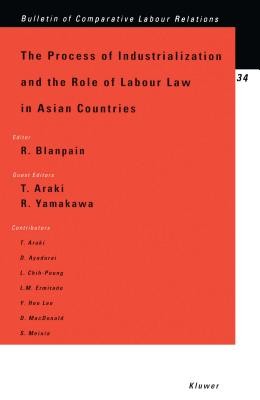
- We will send in 10–14 business days.
- Author: Roger Blanpain
- Publisher: Kluwer Law International
- Year: 1999
- Pages: 172
- ISBN-10: 904111047X
- ISBN-13: 9789041110473
- Format: 15.6 x 23.4 x 0.9 cm, minkšti viršeliai
- Language: English
- SAVE -10% with code: EXTRA
The Process of Industrialization and the Role of Labour Law in Asian Countries (e-book) (used book) | bookbook.eu
Reviews
Description
The role of state or the function of labor law during industrialization in Asian countries is of utmost importance when examining how Asian labor laws differ from European or American labor law models and whether or not any common characteristics exist in Asian labor law. The seven national reports (Australia, China, Japan, Korea, Malaysia, the Philippines, Taiwan) included in this volume provide an overview of the regulation of union organization, collective bargaining, and industrial disputes. These reports also analyze the role of government in industrial relations in the course of economic development. In regulations on formation of labor unions, some countries have the least government intervention whereas others have experienced more direct government control through imposition of certain forms of labor unions or registration requirements and procedures. The same applies to regulations on collective bargaining and industrial disputes. A review of the national reports reveals that while diversity in labor laws exists in the Asian countries represented, the significant role of government in labor relations is widely recognized. Through various modes of government there is commitment to industrial relations ranging from direct intervention to indirect, soft intervention. Whether the government's significant role in industrial relations in Asian countries is a transitional phenomenon which takes place during economic development and maturity of democracy, or whether Asian labor law is heading for a new labor law model which differs from the western model merits further examination. The national papers in this volume provide fundamental information on current labor laws in Asian countries and on comparable characteristics in western labor law models.
EXTRA 10 % discount with code: EXTRA
The promotion ends in 21d.18:53:50
The discount code is valid when purchasing from 10 €. Discounts do not stack.
- Author: Roger Blanpain
- Publisher: Kluwer Law International
- Year: 1999
- Pages: 172
- ISBN-10: 904111047X
- ISBN-13: 9789041110473
- Format: 15.6 x 23.4 x 0.9 cm, minkšti viršeliai
- Language: English English
The role of state or the function of labor law during industrialization in Asian countries is of utmost importance when examining how Asian labor laws differ from European or American labor law models and whether or not any common characteristics exist in Asian labor law. The seven national reports (Australia, China, Japan, Korea, Malaysia, the Philippines, Taiwan) included in this volume provide an overview of the regulation of union organization, collective bargaining, and industrial disputes. These reports also analyze the role of government in industrial relations in the course of economic development. In regulations on formation of labor unions, some countries have the least government intervention whereas others have experienced more direct government control through imposition of certain forms of labor unions or registration requirements and procedures. The same applies to regulations on collective bargaining and industrial disputes. A review of the national reports reveals that while diversity in labor laws exists in the Asian countries represented, the significant role of government in labor relations is widely recognized. Through various modes of government there is commitment to industrial relations ranging from direct intervention to indirect, soft intervention. Whether the government's significant role in industrial relations in Asian countries is a transitional phenomenon which takes place during economic development and maturity of democracy, or whether Asian labor law is heading for a new labor law model which differs from the western model merits further examination. The national papers in this volume provide fundamental information on current labor laws in Asian countries and on comparable characteristics in western labor law models.


Reviews